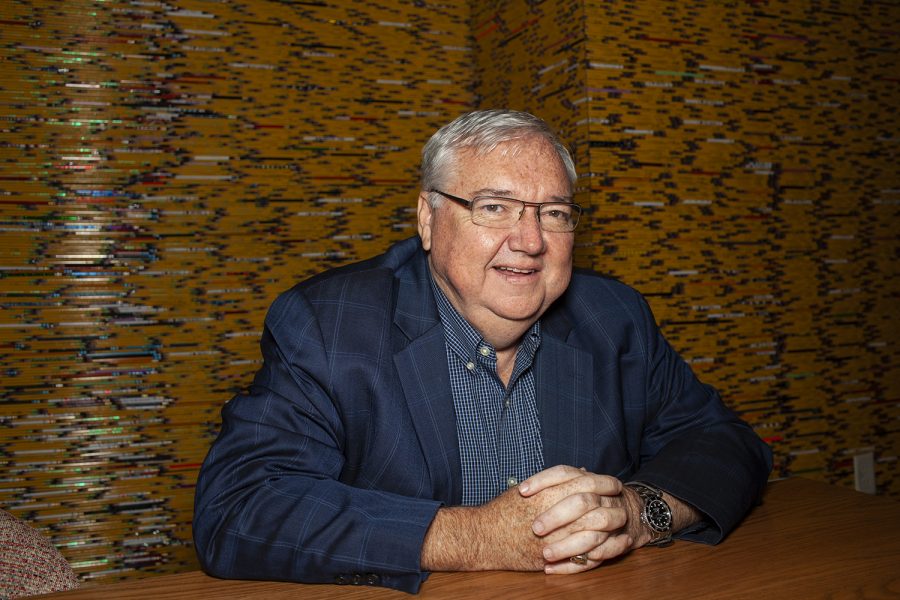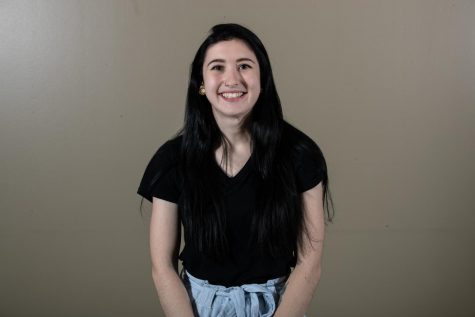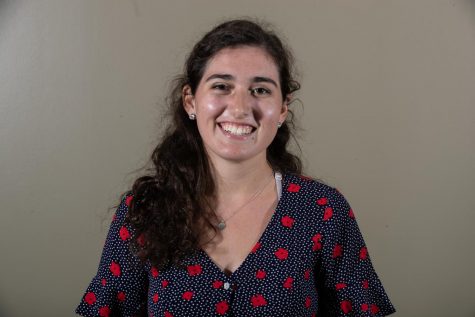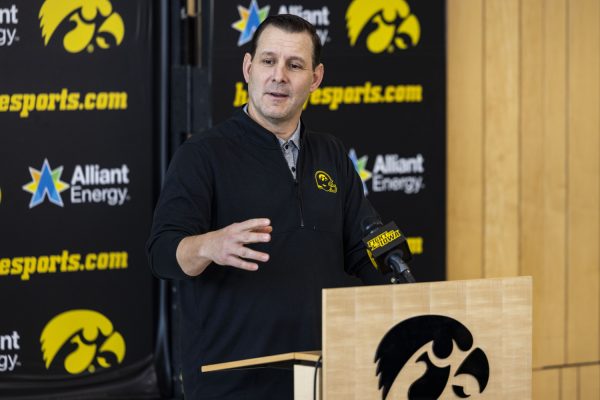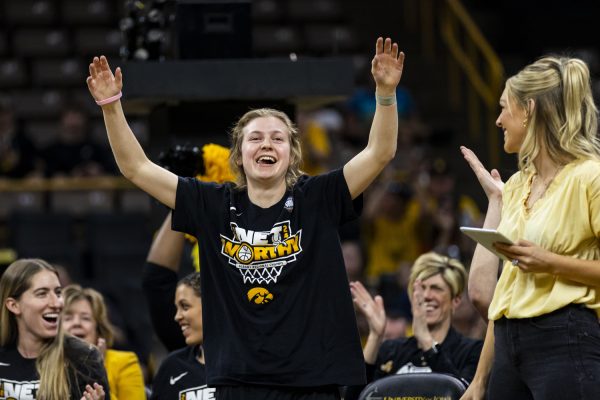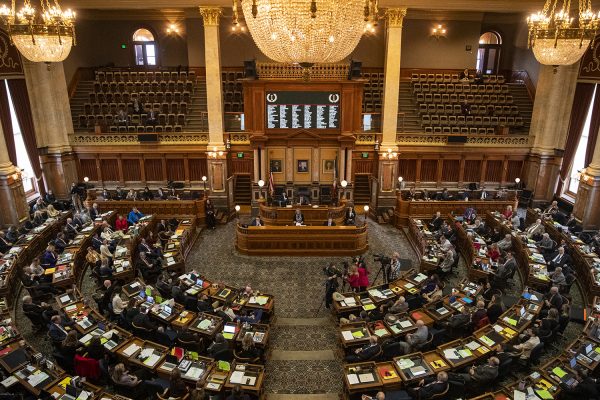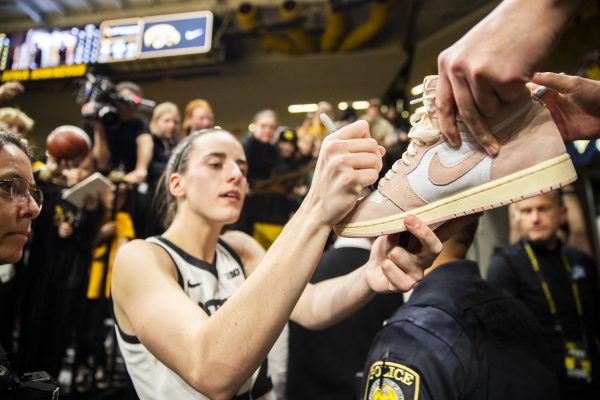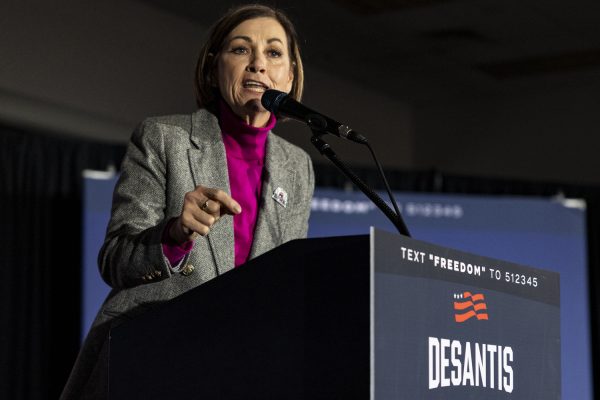UI alum Barry Jackson talks careers in White House, Congress
University of Iowa alumni Barry Jackson came back to his alma mater and talked about his experiences working as a top aid to former U.S. House Speaker John Boehner and as a senior staff member to George W. Bush.
Barry Jackson poses for a portrait in Poindexter Coffee on Wednesday, Oct. 23, 2019.
November 6, 2019
Described as one of the University of Iowa’s most distinguished alumni, Barry Jackson calls working at the White House the worst job he’s ever had, but said he would never give up his experience serving the president.
“When you walk through the gates for the first time, and you realize the importance of your job — it doesn’t matter what job you are, the fact that you’re there, serving the people and serving the president, it’s amazing,” Jackson said.
Jackson, a longtime conservative and an Ohio native, worked as a senior staff member for eight years to President George W. Bush as the assistant to the president for strategic initiatives. Prior to the White House, Jackson worked as chief of staff to former Speaker of the House John Boehner from 1991 to 2001, and then again from 2010 to 2012.
Peter Rough, who worked under Jackson in the communications office for a year and a half starting in 2007, said Jackson was in the office so much, he and a colleague kept a running tab on the hours Jackson’s parked car was on the street outside the West Wing.
“We always said, we just want to one time come into the office in the morning or leave at night and be there either before his car gets there or after his car leaves,” Rough said. “But his car would always be there.”
RELATED: How a UI grad became a central Republican strategist in the Kavanaugh hearings, Trump impeachment
Jackson oversaw several offices in the West Wing, and Rough said his old team in the Office of Strategic Initiatives referred to themselves as being “citizens of Jacksonville.”
“Once you’re a citizen of Jacksonville, it’s really hard to be stripped of your citizenship,” Rough said, saying Jackson did a good job being in tune with his staff. “He’s the mayor of Jacksonville, and he looks after his subjects.”
A graduate of the UI School of Journalism and Mass Communication, Jackson was recruited to the SJMC Professional Advisory Board in the early 2000s by Jeff Liebermann, assistant vice president at the UI Center for Advancement.
Jackson kept in contact with people he worked with at the University of Iowa as a student — sometimes from Air Force One.
David Dierks, former vice president of the UI Foundation (now called the UI Center for Advancement), said in an email to The Daily Iowan that during the Bush administration, he got a call in his UI office from Jackson on the plane. Dierks said no one believed him, until Jackson put Bush’s White House Press Secretary Dana Perino on the phone.
“Those of us left in the organization — and who remember his days here — are so delighted and proud of the progress he has made in his career,” Dierks said in the email.
Jackson played an instrumental role in 1994 in helping Republicans regain control of the U.S. House of Representatives for the first time in 40 years. Jackson helped coordinate the Contract for America, a movement put in place by House Speaker Newt Gingrich in an effort to become the majority party in the House. The document, which outlined a Republican legislative agenda, was signed by Republicans in the House minority in 1994 under Gingrich, shortly before the House flipped red.
RELATED: Stacey Abrams ‘happy’ to run as vice presidential candidate, she says at University of Iowa
Former Chairman of the Republican National Committee, Jim Nicholson, said when he was elected chairman in 1997, he worked closely with Jackson in translating and communicating the proposed policies laid out in the Contract for America document to Republican officeholders, candidates, and activists. During Bush’s first term, Nicholson served as the U.S. Ambassador to the Vatican in Rome, and then in Bush’s second term, he served as the Secretary for Veteran’s Affairs.
“And there’s Barry Jackson in the White House, as what I would call him the master convener, … making sure that all parts of the White House, and those out in the cabinet agencies, were in full partnership with advancing the President’s agenda,” Nicholson said.
September 11, 2001
Jackson was sitting in his West Wing office watching the TV when he saw the first plane hit the Twin Towers.
“Most people in government came to this recognition that not only were we unprepared for what occurred, but we didn’t have things in place to make sure it didn’t happen again,” Jackson said. “Things that you just never would assume that you would have to do, all of a sudden became really important and critical, and you had to do it.”
Jackson arrived to work very early the day after the attacks, and said the security detail that typically surrounds the White House extended to Constitution Avenue, where there were Humvees and security officers armed with machine guns.
“I was crying as I was driving in, because everything about Washington, everything about government, everything about whoever — you knew had just changed,” Jackson said.
He said for Bush’s first term, dealing with the repercussions of what happened on Sept. 11 became 80 percent of what everyone was doing in the White House. No matter if you were working on education policy or agriculture policy, he said, everyone had a sense that over all, the president’s most important question was, “How do I ensure this never happens again?”
Jackson said they worked with Congress to advocate legislative changes surrounding the power of the executive in dealing with national security issues since a terrorist attack of this scale had never been seen before on U.S. soil.
Jackson has never been to the completed Ground Zero memorial, and said he doesn’t plan to go in the future.
Amplifying partisanship
With Trump’s nontraditional presidency, Jackson said party polarization is much more amplified than when he worked as a top aid in Congress.
He said the news media has become more interpretive and said the increased access to information — and misinformation — can all be credited for today’s heightened political climate.
“Any time you hear a politician whining about how unfair it is, I’m sorry, you know, you chose to put yourself out there,” Jackson said. “You knew the environment.”
Jackson said when he worked in the White House and in Congress, he had a handful of journalists he could trust to paint a fair and objective version of a story. He said even if he knew a reporter might write something negative about him, he always presented a reporter with facts, and then would give his take on the situation and trusted the journalist to write from both sides.
With 24-hour news coverage and platforms for anonymous stories to be reposted, he said stories are being shared on a scale that never existed before.
“Sadly, most of that stuff is not policy-related,” Jackson said. “It’s personal-related accusations of sexual misconduct or financials, or whatever it is.”
He acknowledged more polarization among Congressional leaders today, and said the role of the House Speaker has always been to protect all 435 members. He said he’s always had a lot of respect for House Speaker Nancy Pelosi, a Democrat, and said she’s everything a leader should be, even though he doesn’t agree with any of her policies.
“She’s an Italian grandma,” Jackson said. “She will stop, and she knows your name and says, ‘how are you?’ and it’s not a phony politician thing.”



